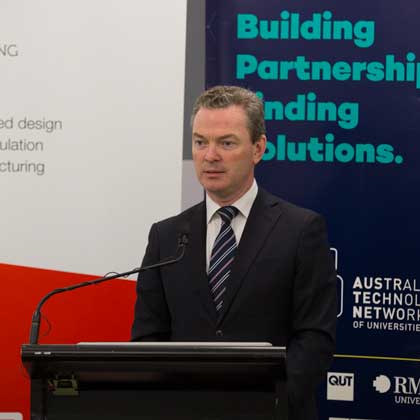Pyne sees room for optimism for manufacturing
01 November 2015Christopher Pyne gave his first speech as Minister for Industry, Innovation and Science on 30 September, saying “There’s room for optimism for manufacturing.”

Pyne was giving the keynote address at the Australian Technology Network (ATN)’s Advanced Manufacturing Collaboration and Innovation Forum. The event was held at RMIT’s award winning Advanced Manufacturing Precinct in Melbourne.
“The Industry, Innovation and Science portfolio is a central economic portfolio,” said Pyne. “It is delivering the means by which Australian industry can lead the world in research and innovation and seize the opportunities that lie ahead. Australia has the infrastructure to underpin this: the researchers, the universities and world-leading institutions like CSIRO, Questacon and others. The Australian Government is creating the environment to commercialise the research.”
The Minister highlighted Australia’s strong economic growth compared to other OECD countries for more than 20 years. However, he noted that the same period has been challenging for Australian manufacturing, whose share of GDP and employment has declined substantially in that time. Pyne stressed the need to create “a new legacy.”
“There’s room for optimism for manufacturing,” the Minister continued. “Preliminary data from a study into global production shows Australia’s share of global exports of elaborately transformed manufactures has grown over the last 25 years, notwithstanding the significant exchange rate movements over that time. In contrast, the OECD share has declined during the same period.
The study confirms that Australia has comparative strengths in high-value, highly transformed manufacturing.” Pyne cited Boeing Australia’s work for the 787 Dreamliner and Quickstep Holdings’ partnerships with some of the world’s largest aerospace/defence organisations as examples of Australian achievements in advanced manufacturing.
He also pointed out high levels of innovativeness among Australia’s SMEs, who are ranked fifth in the OECD on innovation, with many SMEs supporting large Australian exporters through local supply chains. “Despite these positive signs, the Government is well aware of the reality for many machinery and equipment manufacturers affected by declining mining investment,” Pyne added. “Taken with the imminent closures of Ford, Holden and Toyota, the future looks particularly difficult. As an open economy, Australia needs to engage with the complex task of economic reform and restructuring, particularly addressing underlying issues of efficiency and productivity.”
Pyne discussed the crucial role that innovation plays in driving productivity growth, which in turn is the key to improving competitiveness, jobs growth and ultimately living standards. He acknowledged the high quality of Australian research, but emphasised the need for that research to benefit the wider economy. He also highlighted Australia’s poor record at commercialising and patenting research outcomes, and the need to improve collaboration between industry and research bodies.
“Our Industry Innovation and Competitiveness Agenda… sets out a new industry policy paradigm by placing science and research at the Pyne sees “room for optimism” for manufacturing Christopher Pyne gave his first speech as Minister for Industry, Innovation and Science on 30 September, saying “There’s room for optimism for manufacturing”. centre of fostering the innovation that will provide the framework to transition industry to high-value added products and services.
Overall, the agenda plays to our strengths and tackles the critical issues facing Australian businesses to build our long-term economic growth and prosperity.” Pyne discussed initiatives such as the $225m Industry Growth Centres and the Cooperative Research Centres programme. He also highlighted a number of schemes to provide assistance for manufacturers, such as the Entrepreneurs’ Programme and the R&D Tax Incentive.
“Our advanced manufacturing companies are achieving enormous breakthroughs and are confirming that there’s a critical mass of knowledge, skills and capacity to capitalise on the new opportunities it presents. Diffusing advanced manufacturing technologies across our traditional manufacturing sector could be game-changing in terms of our global competitiveness. “The impetus for change in the economy is there,” he concluded. “It needs a concerted effort.”
Promoting collaboration and innovation
The ATN Forum was part of a series of four events commissioned by the Federal Government’s Department of Industry focusing on key sectors of national importance. The event gathered manufacturers from the textile and geosynthetics industries, senior representatives from global automotive and aerospace organisations, as well as innovative researchers in the advanced manufacturing sector.
Along with Pyne’s keynote address, there were presentations showcasing various research discoveries by ATN member universities. Associate Professor Drew Evans from the University of South Australia shared details of his team’s recent work developing thin film coatings for use in the automotive industry, while Professor Milan Brandt of RMIT discussed the latest innovations in additive manufacturing, with a particular focus on generating new intellectual property (IP). Professor Sam Bucolo of the University of Technology Sydney also gave a talk about the use of design-led innovation as a means to enable collaboration.
In addition, Professor Göran Roos of the SA Economic Development Board led a facilitated group dialogue on how to foster innovation and promote collaboration between industry and research bodies such as universities. ATN Executive Director Renee Hindmarsh said the Forum was an opportunity to drive genuine progress towards enhancing collaborative research outcomes. “It is vital Australia embraces Advanced Manufacturing to ensure we are a world leading, value-adding economy,” said Hindmarsh prior to the event.
“Today’s forum will examine technology game-changers that will drive innovation, and discuss approaches to bridging the gap between industry and research outcomes. The ATN welcomes the Prime Minister’s focus on improving collaboration between universities and business, and the ATN forums are an important step towards achieving this.”
Source: AMT Magazine November 2015
